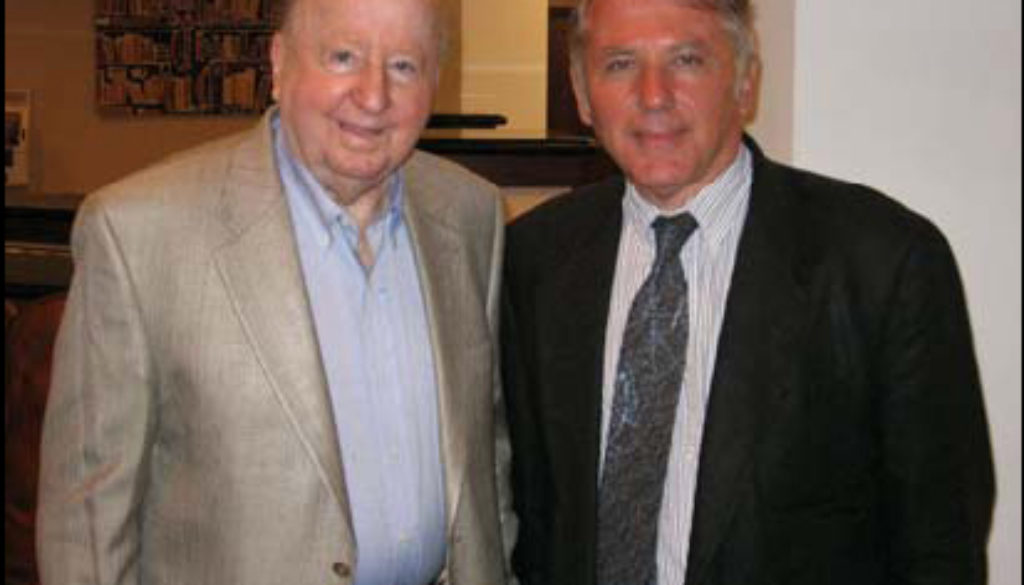Nanopoulos Honored with Onassis International Prize
Dr. Dimitri Nanopoulos, a distinguished professor of physics at Texas A&M University and one of the world’s most noted researchers in high-energy physics, has been selected by the Alexander S. Onassis Public Benefit Foundation to receive the 2006 Onassis International Prize in honor of his achievements in the natural sciences.
Nanopoulos’ Onassis Prize is one of four that will be presented Wednesday (October 18) by the President of the Hellenic Republic, His Excellency Mr. Carolos Papoulias, in an official ceremony in Athens, Greece.
Established by the Onassis Foundation in 1978, the International Prizes Program honors individuals and organizations that provide services in specific areas, including culture, social contribution and the environment. Each award consists of a silver and gold medal, a scroll and a $200,000 cash prize.
Nanopoulos, a member of the Texas A&M faculty since 1989 and holder of the Mitchell-Heep Chair in High-Energy Physics since 2002, has pioneered some of the most important links between the present understanding of high-energy physics and the ultimate unification of the Universe with superstrings. His many contributions to research and scholarly knowledge have impacted related fields ranging from particle physics and cosmology to fundamental quantum theory and quantum-inspired models of brain function.
“I am humbled and honored, both for myself and for scientists worldwide, because I believe this is the first time the Onassis Foundation has given an International Prize recognizing basic science,” Nanopoulos explains. “I think it is quite impressive for them to take such a turn, because it shows we have an impact on society.
“When I started in cosmology, people were saying it was for cuckoos. Now, in part because of the recent Nobel Prize that helps to legitimize it as a field, I’m pleased to say it is recognized as a precise science.”
Dr. Samuel C.C. Ting, an American physicist who shared in the 1976 Nobel Prize for Physics for his discovery of the J/psi particle, credits Nanopoulos as one of the founders of Grand Unified Theory (GUT), which Ting describes as “an effective way to combine gravitation, electroweak and strong forces — a dream of every physicist since Einstein.” He and Texas A&M physics professor Peter McIntyre currently are testing Nanopoulos’ theory with an experiment on the International Space Station that they hope will provide answers to some of the biggest questions of cosmology.
“You are truly a giant in modern physics,” Ting told Nanopoulos in a congratulatory electronic mail message. “Your award is richly deserved, and I sincerely hope in the near future you will receive other recognition.”
McIntyre, who has known Nanopoulos for 30 years since they first met in the late 1970s as research fellows working with respective Nobel Prize winners Carlo Rubbia and Steven Weinberg at Harvard University, will accompany Nanopoulos to Athens and deliver introductory remarks on his behalf.
“One measure of a scientist is his choice of problems,” McIntyre says. “Many scientists have keen intellects and mastery of the science of the day. But a challenging problem typically takes years of effort to master, and it is therefore imperative to choose those golden problems that have the potential to make a major breakthrough in how we view nature. By this highest of standards, Dimitri has shown his mettle, not once, but now several times over.
“Texas is proud of Dimitri, Greece is proud of Dimitri, and I expect that his greatest work is yet to come.”
Wednesday’s ceremony will commemorate the Onassis Foundation’s 30th anniversary as well as the 100th anniversary of the birth of its founder, legendary Greek shipping magnate and self-made billionaire Aristotle Onassis. As part of a month-long celebration of Onassis’ life, it is expected to be attended by more than 2,500 guests, including government dignitaries, academicians, foreign diplomats and representatives of Greek cultural and social circles.
Nanopoulos notes that the 2006 prizes are particularly unique because they are the first to be awarded since 2000, the year the Foundation opted to bestow future prizes only upon special resolution on the basis of indisputable merit, rather than time or custom. Prior to 2000, prizes were awarded either annually (1978 to 1992) or biannually (1993 to 2000).
Nanopoulos, who also serves as head of the Houston Advanced Research Center (HARC) astroparticle physics group and of a research department of the World Laboratory based in Switzerland, has authored 13 books and more than 550 refereed articles. His work has been cited by other authors more than 30,500 times, ranking him as the fourth-most-cited high-energy physicist of all time.
In 2005, Nanopoulos was appointed as President of the Greek National Council for Research and Technology and as Greece’s national representative to both the European Laboratory for Particle Physics (CERN) and the European Space Agency (ESA). In 1997, he became the youngest member elected to the Academy of Athens’ Natural and Applied Sciences.
A fellow of the American Physical Society (APS), Nanopoulos is a two-time winner of the Gravity Research Foundation’s Annual Essay Prize, most recently in 2005, the celebration year of the 100th anniversary of Einstein’s Theory of Relativity. He is a graduate of the University of Athens and received his doctorate from the University of Sussex in England.
To learn more about Nanopoulos and his research, visit http://faculty.physics.tamu.edu/dimitri/.
-aTm-
Contact: Shana K. Hutchins, (979) 862-1237 or shutchins@science.tamu.edu or Dr. Dimitri Nanopoulos, (979) 845-7790 or dimitri@physics.tamu.edu
The post Nanopoulos Honored with Onassis International Prize appeared first on Texas A&M College of Science
